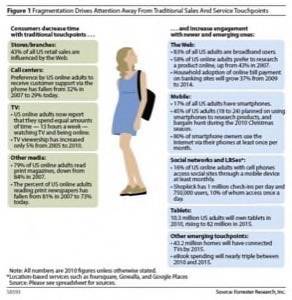Thanks to the proliferation of Web and mobile technologies, commerce is evolving from a multi-channel effort for businesses to a more holistic one that takes place across multiple devices or consumer touchpoints. Emerging in the place of traditional multi-channel commerce? Agile commerce.

Such is the key takeaway from a recent report by Forrester, which outlines precisely how consumer behavior is changing in response to things like widespread broadband penetration, smart phones and social media.
According to the report, 58% of online adults in the U.S. like to research products online before purchasing them. Of course, a growing number of those adults own smart phones and tablet computers and are active on social networking sites, which they often use to solicit advice an input on buying decisions.

To adapt, businesses must realign themselves to adopt practices of agile commerce, that is, commerce that takes place across a wide range of devices, screens and other interfaces. This adaptation may require a literal organizational change (think smaller, integrated teams), but at the very least, calls for a shift in a company’s philosophy.
For one, the relationship between businesses and customers should be thought of across touchpoints rather than channels, says the report. Now that companies have a boat load of rich analytics about their customers, they should utilize that data and make doing so a core component of the business. Web analytics, business intelligence, CRM and data warehouses all come into play here.
Has your organization made any changes to keep up with increasingly connected consumers? Let us know in the comments.





















